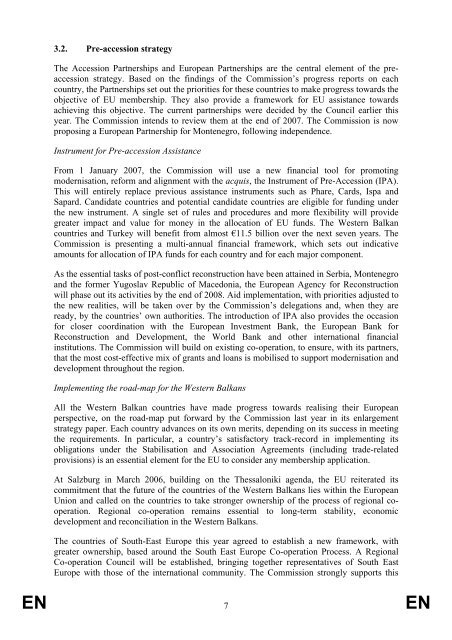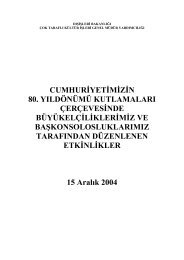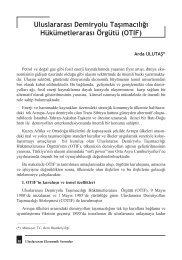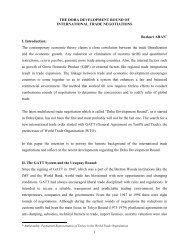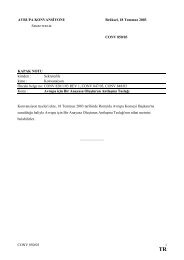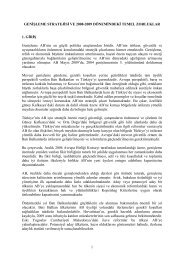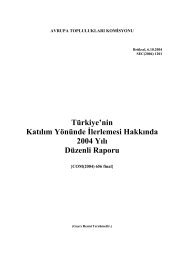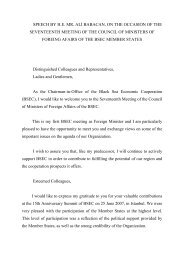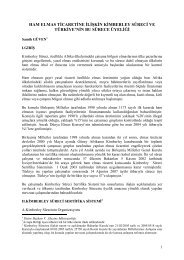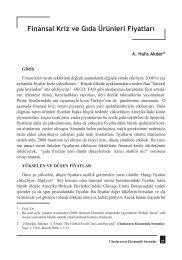Enlargement Strategy and Main Challenges 2006 - 2007
Enlargement Strategy and Main Challenges 2006 - 2007
Enlargement Strategy and Main Challenges 2006 - 2007
Create successful ePaper yourself
Turn your PDF publications into a flip-book with our unique Google optimized e-Paper software.
3.2. Pre-accession strategy<br />
The Accession Partnerships <strong>and</strong> European Partnerships are the central element of the preaccession<br />
strategy. Based on the findings of the Commission’s progress reports on each<br />
country, the Partnerships set out the priorities for these countries to make progress towards the<br />
objective of EU membership. They also provide a framework for EU assistance towards<br />
achieving this objective. The current partnerships were decided by the Council earlier this<br />
year. The Commission intends to review them at the end of <strong>2007</strong>. The Commission is now<br />
proposing a European Partnership for Montenegro, following independence.<br />
Instrument for Pre-accession Assistance<br />
From 1 January <strong>2007</strong>, the Commission will use a new financial tool for promoting<br />
modernisation, reform <strong>and</strong> alignment with the acquis, the Instrument of Pre-Accession (IPA).<br />
This will entirely replace previous assistance instruments such as Phare, Cards, Ispa <strong>and</strong><br />
Sapard. C<strong>and</strong>idate countries <strong>and</strong> potential c<strong>and</strong>idate countries are eligible for funding under<br />
the new instrument. A single set of rules <strong>and</strong> procedures <strong>and</strong> more flexibility will provide<br />
greater impact <strong>and</strong> value for money in the allocation of EU funds. The Western Balkan<br />
countries <strong>and</strong> Turkey will benefit from almost €11.5 billion over the next seven years. The<br />
Commission is presenting a multi-annual financial framework, which sets out indicative<br />
amounts for allocation of IPA funds for each country <strong>and</strong> for each major component.<br />
As the essential tasks of post-conflict reconstruction have been attained in Serbia, Montenegro<br />
<strong>and</strong> the former Yugoslav Republic of Macedonia, the European Agency for Reconstruction<br />
will phase out its activities by the end of 2008. Aid implementation, with priorities adjusted to<br />
the new realities, will be taken over by the Commission’s delegations <strong>and</strong>, when they are<br />
ready, by the countries’ own authorities. The introduction of IPA also provides the occasion<br />
for closer coordination with the European Investment Bank, the European Bank for<br />
Reconstruction <strong>and</strong> Development, the World Bank <strong>and</strong> other international financial<br />
institutions. The Commission will build on existing co-operation, to ensure, with its partners,<br />
that the most cost-effective mix of grants <strong>and</strong> loans is mobilised to support modernisation <strong>and</strong><br />
development throughout the region.<br />
Implementing the road-map for the Western Balkans<br />
All the Western Balkan countries have made progress towards realising their European<br />
perspective, on the road-map put forward by the Commission last year in its enlargement<br />
strategy paper. Each country advances on its own merits, depending on its success in meeting<br />
the requirements. In particular, a country’s satisfactory track-record in implementing its<br />
obligations under the Stabilisation <strong>and</strong> Association Agreements (including trade-related<br />
provisions) is an essential element for the EU to consider any membership application.<br />
At Salzburg in March <strong>2006</strong>, building on the Thessaloniki agenda, the EU reiterated its<br />
commitment that the future of the countries of the Western Balkans lies within the European<br />
Union <strong>and</strong> called on the countries to take stronger ownership of the process of regional cooperation.<br />
Regional co-operation remains essential to long-term stability, economic<br />
development <strong>and</strong> reconciliation in the Western Balkans.<br />
The countries of South-East Europe this year agreed to establish a new framework, with<br />
greater ownership, based around the South East Europe Co-operation Process. A Regional<br />
Co-operation Council will be established, bringing together representatives of South East<br />
Europe with those of the international community. The Commission strongly supports this<br />
EN 7 EN


